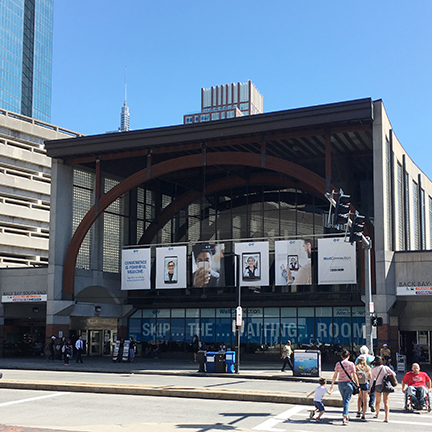Boston, MA - Back Bay Station (BBY)
The Back Bay neighborhood was created in the late 19th century by filling a tidal estuary of the Charles River. The current station was built in 1987 and includes public art installations.

Back Bay Station
145 Dartmouth Street
Boston, MA 02116-5162
Annual Station Ridership (FY 2023): 750,036
- Facility Ownership: Massachusetts Bay Transportation Authority
- Parking Lot Ownership: N/A
- Platform Ownership: Massachusetts Bay Transportation Authority
- Track Ownership: Massachusetts Bay Transportation Authority
Jane Brophy
Regional Contact
governmentaffairsnyc@amtrak.com
For information about Amtrak fares and schedules, please visit Amtrak.com or call 1-800-USA-RAIL (1-800-872-7245).
Boston’s Back Bay station was built in 1987 as part of the Massachusetts Bay Transit Authority (MBTA) Orange Line’s Southwest Corridor project and was dedicated by Governor Michael Dukakis. This modern concrete and brick facility replaced a station which was built in 1899 where the Boston & Providence and Boston & Albany railroads once crossed. That station burned in 1928 and was rebuilt in 1929, but little of it remains today.
MBTA is known for its investment in public art in its Orange Line T stations, and two such engraved sculptures sit outside the Back Bay station and are arranged to look like a sun dial as commentary upon the passage of time in a very busy spot. MBTA, UrbanArts and Boston Contemporary Writers, together with the Cambridge Arts Council, have collaborated on various projects since 1979. There are more than 75 pieces of public art on the Green, Blue, Red and Orange MBTA subway lines; most reflect Boston’s history.
Back Bay, before the 19th century, truly was a tidal estuary of the Charles River. In 1857, a massive project began to fill the tidewater flats with gravel and soil brought in by rail from Needham, six miles away. The filling of present-day Back Bay was completed by 1882. The development of this upper-middle-class neighborhood was architect Arthur Gilman with Gridley James Fox Bryant. Strict regulations produced a uniform and well-integrated architecture, consisting mostly of dignified three- and four-story brownstones, primarily residential.
The Back Bay neighborhood became home to some of Boston’s leading institutions, beginning with the Massachusetts Institute of Technology (MIT), which was founded in 1861 near Copley Square; this building is no longer standing. However, Copley Square is home to several other memorable institutions, such as the Fairmont Copley Plaza Hotel (1912), the Beaux-Arts Boston Public Library (1892), the Old South Church (1875) and the John Hancock Tower (1972). The “Back Bay Historic District” was listed on the National Register of Historic Places on August 14, 1973. The Back Bay station is itself close to Copley Square.
Boston is one of the most storied cities in the United States, its history much entwined with the nation’s origins. The Shawmut Peninsula, upon which the city is situated, was originally connected to the mainland by only a narrow neck of land, surrounded by Boston Harbor and the Back Bay, an estuary of the Charles River. The peninsula, archaeologists have discovered, had been inhabited by natives as early as 7,500 years ago. Euro-American settlers arrived first in Charlestown, across the harbor, and the first settlement on the peninsula, begun by William Blaxton in 1625, was called Trimountaine for the three hills there (only an abbreviated Beacon Hill remains today). In 1630, the Puritans of the Massachusetts Bay Colony signed an agreement with the English Crown and the Winthrop Fleet sailed to the New World, arriving in Boston by way of Salem and Charlestown. The settlement of Trimountaine had its name changed to Boston on September 7, 1630, and Governor Winthrop founded the City of Boston on September 17, naming it after the town of Boston, Lincolnshire, from which many of the settlers came.
The Puritan community of Boston has bequeathed its culture of learning, self-reliance and hard work to the city. Boston grew to be the largest settlement in the Colonies and remained so until the 1760s. During the early 1770s, Boston played a primary role in sparking both the American Revolution and the ensuing war with Britain. The city was the site of the Boston Massacre, the Boston Tea Party, and battles such as Lexington and Concord and Bunker Hill. Thus, between revolutionary leaders coming from Boston and the citizen’s fight for rights, the city is sometimes styled the “Cradle of Liberty.”
In the 19th century, the city became one of the world’s wealthiest international ports, exporting products such as rum, fish, salt, and tobacco. Chartered as a city in 1822, by the mid-1800s Boston also became one of the largest manufacturing centers in the nation, noted for garment production, leather goods, and machinery. Manufacturing overtook international trade in dominating the local economy, and the many local streams and rivers not only allowed easy shipment of goods inland but also provided power for many mills and factories.
Following the potato famine of 1845-49, Boston became a haven for Irish immigrants who have since dominated the culture and leadership of a city that became increasingly diverse in character. Boston was traditionally divided into many ethnic neighborhoods which expanded into the surrounding towns, annexing them. Boston also grew physically not through annexation but through landfill and using two of the three large hills as well as rubble and gravel shipped in to widen the peninsula to its present breadth.
Today, the region’s colleges and universities have a major impact on the city and region’s economy, with students contributing an estimated $4.8 billion annually. Boston’s reputation as the “Athens of America” derives largely from the teaching and research activities of more than 100 colleges and universities in the Greater Boston area, such as Harvard, MIT, Boston College and the University of Massachusetts (Boston). Tourism, healthcare, financial services, publishing, printing and four major convention centers also contribute to the economy, as well as its being the state capital and regional home of federal agencies.
Station Building (with waiting room)
Features
- ATM available
- Elevator
- Payphones
- Quik-Trak kiosks
- Restrooms
- Ticket sales office
- Unaccompanied child travel allowed
- Vending machines
- No WiFi
- Arrive at least 30 minutes prior to departure
Baggage
- Amtrak Express shipping not available
- No checked baggage service
- No checked baggage storage
- Bike boxes not available
- Baggage carts available
- Ski bags not available
- No bag storage
- Shipping boxes not available
- Baggage assistance provided by
Parking
- Same-day parking is available; fees may apply
- Overnight parking is available; fees may apply
Accessibility
- Payphones
- Accessible platform
- Accessible restrooms
- Accessible ticket office
- Accessible waiting room
- Accessible water fountain
- Same-day, accessible parking is available; fees may apply
- Overnight, accessible parking is available; fees may apply
- High platform
- Wheelchair available
- No wheelchair lift
Hours
Station Waiting Room Hours
| Mon | 05:00 am - 11:59 pm |
| Tue | 05:00 am - 11:59 pm |
| Wed | 05:00 am - 11:59 pm |
| Thu | 05:00 am - 11:59 pm |
| Fri | 05:00 am - 11:59 pm |
| Sat | 05:00 am - 11:59 pm |
| Sun | 05:00 am - 11:59 pm |
Ticket Office Hours
| Mon | 06:00 am - 10:30 pm |
| Tue | 06:00 am - 10:30 pm |
| Wed | 06:00 am - 10:30 pm |
| Thu | 06:00 am - 10:30 pm |
| Fri | 06:00 am - 10:30 pm |
| Sat | 06:00 am - 10:30 pm |
| Sun | 06:00 am - 10:30 pm |
Passenger Assistance Hours
| Mon | 06:30 am - 10:15 pm |
| Tue | 06:30 am - 10:15 pm |
| Wed | 06:30 am - 10:15 pm |
| Thu | 06:30 am - 10:15 pm |
| Fri | 06:30 am - 10:15 pm |
| Sat | 06:30 am - 10:15 pm |
| Sun | 06:30 am - 10:15 pm |
Checked Baggage Service
Parking Hours
Quik-Track Kiosk Hours
| Mon | 05:00 am - 11:59 pm |
| Tue | 05:00 am - 11:59 pm |
| Wed | 05:00 am - 11:59 pm |
| Thu | 05:00 am - 11:59 pm |
| Fri | 05:00 am - 11:59 pm |
| Sat | 05:00 am - 11:59 pm |
| Sun | 05:00 am - 11:59 pm |


 Amtrak established the Great American Stations Project in 2006 to educate communities on the benefits of redeveloping train stations, offer tools to community leaders to preserve their stations, and provide the appropriate Amtrak resources.
Amtrak established the Great American Stations Project in 2006 to educate communities on the benefits of redeveloping train stations, offer tools to community leaders to preserve their stations, and provide the appropriate Amtrak resources. For more than 50 years, Amtrak has connected America and modernized train travel. Offering a safe, environmentally efficient way to reach more than 500 destinations across 46 states and parts of Canada, Amtrak provides travelers with an experience that sets a new standard. Book travel, check train status, access your eTicket and more through the
For more than 50 years, Amtrak has connected America and modernized train travel. Offering a safe, environmentally efficient way to reach more than 500 destinations across 46 states and parts of Canada, Amtrak provides travelers with an experience that sets a new standard. Book travel, check train status, access your eTicket and more through the